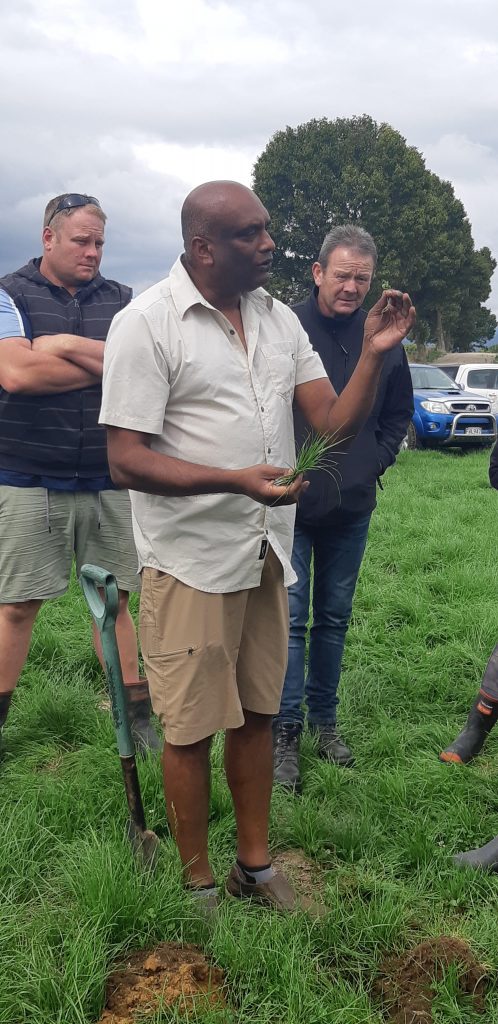Waikato-based Soil Scientist Gordon Rajendram PhD is considered one of New Zealand’s experts in soil fertility. He is committed to helping New Zealand farmers get the most out of their soil so that their farm can work more proficiently, be sustainable while still increasing the farm profitability. Dr. Gordon Rajendram worked at AgResearch, Ruakura Research Centre, Hamilton. He has developed two field calibrated soil tests (N & S) which are used for agronomic advice in NZ and his work on leaching has been included in the Overseer nutrient model.

Soils will continue to change over time, that’s why regular soil testing is crucial to the continued health and success of your farm says Hamilton-based leading Soil Scientist Dr Gordon Rajendram (PhD).
Soil testing will showcase the mineral imbalances that may be affecting the health of your crops or livestock.
Macroporosity is a measure of the proportion of large pores in the soil that provide the air supply to roots and microbes. A 10 % decrease in pasture production for every 1% decrease in microporosity below the critical level of 10 %. It’s the best soil physical field calibrated test for New Zealand and was developed by AgResearch in the late 1990s.
Treading damage can cost loss in pasture production. “When soil structure is damaged, the infiltration, rate decreases and pores that are required for aeration and drainage are destroyed,” says Gordon.
Other issues include ~80% decrease in worm populations, Increased runoff of water, sediment, faecal coliforms, phosphate and other nutrients plus Increased greenhouse gases.
An ASC test (Anion Storage Capacity), previously known as P Retention, is a measure used to define the phosphorus (P) immobilisation potential of a soil. This will test the ability of the soil to hold on to phosphate and sulphur.
An ASC test must be included with every sampled area to determine its level. “This is particularly valuable information when bearing in mind the use of phosphorus and sulphur fertilisers,” adds Gordon. Low ASC soils have minimal P binding sites.
Once you have all the testing done, and have all the accurate information on what needs to go on your soil, the next step is to develop a fertiliser programme specific to each area or paddock. Fine particle or slow-release fertiliser is a great choice.
Fine particle fertiliser has improved fertiliser use efficiency with lower spread rates required to get the most out of it. “Featuring a rapid uptake of needed nutrients, with fine particle fertiliser deficiencies can be rectified quickly due to the excellent foliar nutrient uptake,” adds Gordon.
With the efficient application the proportion of nutrients can be varied. Not only that, it also has reduced environmental impact.
You may not be able to change your soil type or the climate, but you can control the amount and type of phosphorus and sulphur that are applied to vulnerable areas.
If you want to discover more about the benefits of soil testing can bring to your farm, then make sure you get the best in New Zealand, the soil scientist Dr Gordon Rajendram out to your rural farm today. With his BSc, MSc and a PhD, Gordon is one of the leading experts on laboratory and field measurement techniques for chemical, biological and physical properties.
About The Soil Scientist
Gordon is dedicated to helping all farmers get most out of their soil so that their farm can work more efficiently, be sustainable while improving the farm profitability.
Contact Gordon:
Email: rajendram@xtra.co.nz
Phone: 021 466 077
Facebook: https://www.facebook.com/GordonRajendramSoilScientist
Website: https://gordonrajendramsoilscientist.co.nz/
LinkedIn: https://www.linkedin.com/company/the-soil-scientist
Instagram: https://www.instagram.com/thesoilscientistnz/
Contact MediaPA:
Phone: 0274 587 724
Email: phillip@mediapa.co.nz
Website: www.mediapa.co.nz
Facebook: www.facebook.com/MediaPA
YouTube: www.youtube.com/user/TheMediaPA